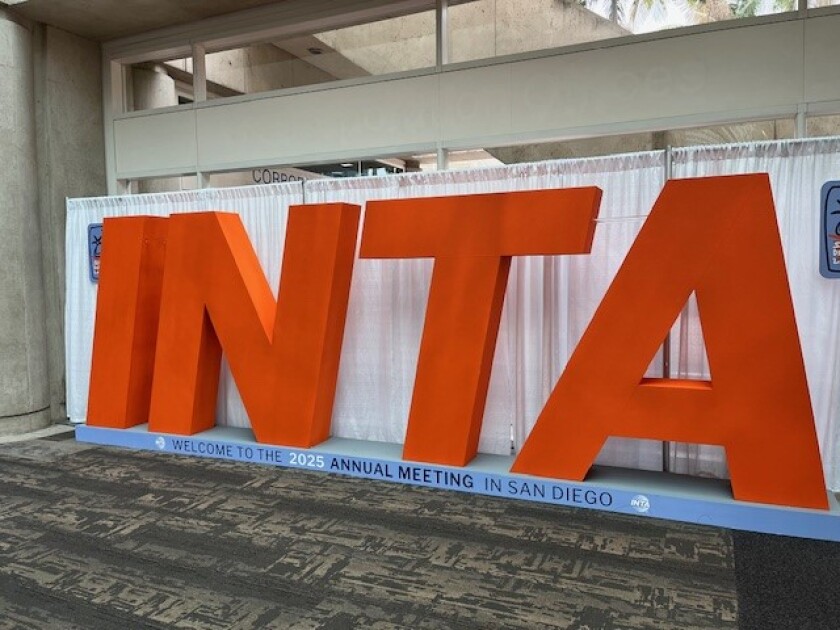As the INTA Annual Meeting in San Diego draws to a close, Managing IP considers some of the things we have learned from another busy week of meetings and sessions.
We also look ahead to London 2026 and provide some handy tips for visiting the UK capital and Managing IP’s home city.
Natural selection
Intellectual property’s role in driving overall business success was a running theme throughout the Annual Meeting.
Indeed, right from the start during the conference’s opening ceremonies, we heard that practitioners must “evolve to survive” and keep up with business’s expectations.
The association’s 2025 president, Elisabeth Stewart Bradley, who is also vice president of innovation law at Bristol Myers Squibb, said in-house counsel’s requirements are shifting.
She noted, for example, that in-house counsel are increasingly looking for firms to have industry expertise, in addition to subject matter knowledge.
“I want to help all our members be comfortable with their expanding responsibilities in the ever-changing, high-pressure environment in which we all operate,” she added.
Managing IP’s What Corporates Want series, in which we survey more than 2,000 in-house counsel on what they want from their external advisers, has uncovered similar themes over the past months.
To be blunt, some of the findings from those reports have uncovered tendencies for law firms to be lacking in key areas. A failure to respond to client queries on time, and a lack of in-depth industry knowledge were just a few that have been identified.
Perhaps the added exposure of INTA’s Annual Meeting calling on practitioners to embrace new requirements will help kick start some changes in this regard.
Eyes on AI
As ever, there was a strong focus on artificial intelligence.
In our meetings with readers and delegates, both in-house and private practice, AI was rarely ignored.
Rather than simply keeping their eye on the various court cases with an AI element, law firms are also ramping up their consideration of how to implement AI into their practices.
Plenty have already begun to think about how the use of AI might affect the way junior lawyers are hired and what they are trained to do.
Training, for example, could shift from the typically practice-based elements (such as document review and drafting) to more direct client-facing work at an earlier stage.
We may be some way away from that, and the need for ‘junior’ or ‘trainee’ lawyers will always exist (who keeps the firm going in the future otherwise?), but it is interesting to consider how it may change.
INTA was also keen to ensure AI was top of its own agenda. In her opening speech, president Bradley said we should “embrace change”.
Plenty of sessions also tackled the topic, with practitioners sharing their use of AI and how it can improve efficiency.
China positivity
Amid plenty of political jousting between the US and China, it was refreshing to hear some positive news regarding China’s IP system.
It seems, at least from an IP perspective, that the overall outlook for Western brand owners continues to be on an upward trend.
China-based law firm East IP provided some key updates for delegates.
For example, there are signs that the US and China are recognising each other’s judgments on IP disputes. East IP founder and partner Joe Simone rightly described this as a “game-changing” development.
Enforcing against bad-faith registrations has also proved an effective method, he noted.
Since 2018, there have been more than 20 decisions in which action was taken against bad-faith filers. In all but three cases, courts confirmed bad-faith filing.
Elsewhere, there are suggestions that other developments, including the creation of an enforcement body similar to the UK’s Police IP Crime Unit (part of the City of London Police dedicated to fighting IP crime), could be on the cards.
Chinese interest in INTA remains strong with 586 registrants for the Annual Meeting – the second most represented jurisdiction.
With the mainstream news occasionally painting a grim picture regarding political tension, it is refreshing to hear positive IP stories.
London calling
In the end, the news that London was to host the 2026 Annual Meeting was not a well-kept secret. Managing IP had been certain that London was the choice a few weeks before the meeting (see our podcast), but we kept the news to ourselves to allow INTA to reveal the location at their opening ceremony.
Strangely, and I’m not sure exactly how it happened, early on the first morning of the conference, INTA posted (and quickly removed) confirmation on its website that London would host the 2026 meeting.
By the time came for the official announcement almost everyone in the room was aware.
London is a great city (I am a tad biased as it’s been my home for the last 12 years), and people who have never been to London are rightly excited.
But there are a couple of tips that attendees should keep in mind.
One is location. The meeting will be hosted in the Excel Centre in London’s Docklands area – ten miles from central London.
The new(ish) Elizabeth Line (a train link through London) will provide a quick route into town.
But attendees would do well to ensure any meetings (whether around the conference centre or in town) are close together.
Also, if you do plan meetings in central London, ensure they are within walking distance of each other. This should be possible. Despite the London Underground map appearing to show large distances between certain locations, plenty of central London is walkable.
Unlike in San Diego, getting a taxi one or two miles across London to a client meeting is a no-go. The taxi ride could take twice as long as the meeting itself!
With plenty of sensible planning, it should work fine, and hopefully it will.
But don’t forget a raincoat!
The INTA Annual Meeting ran from May 17 to 21 at the San Diego Convention Center.











